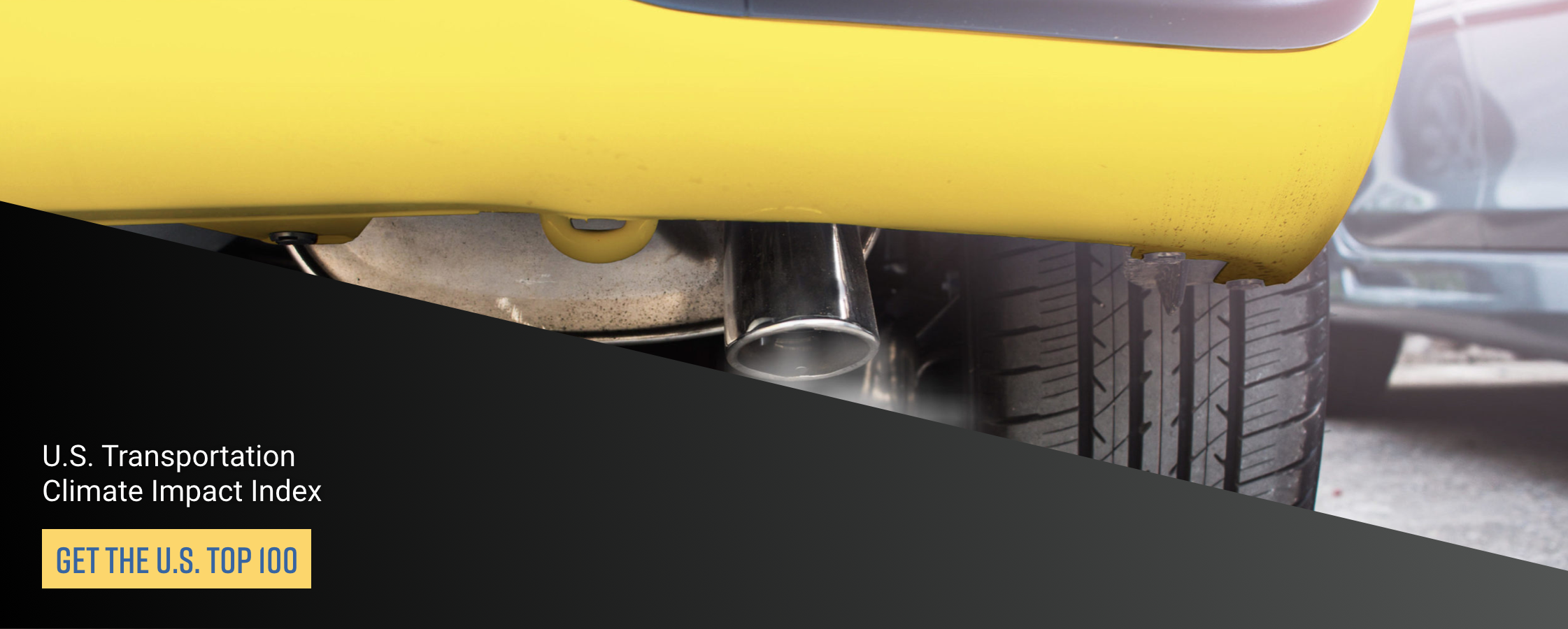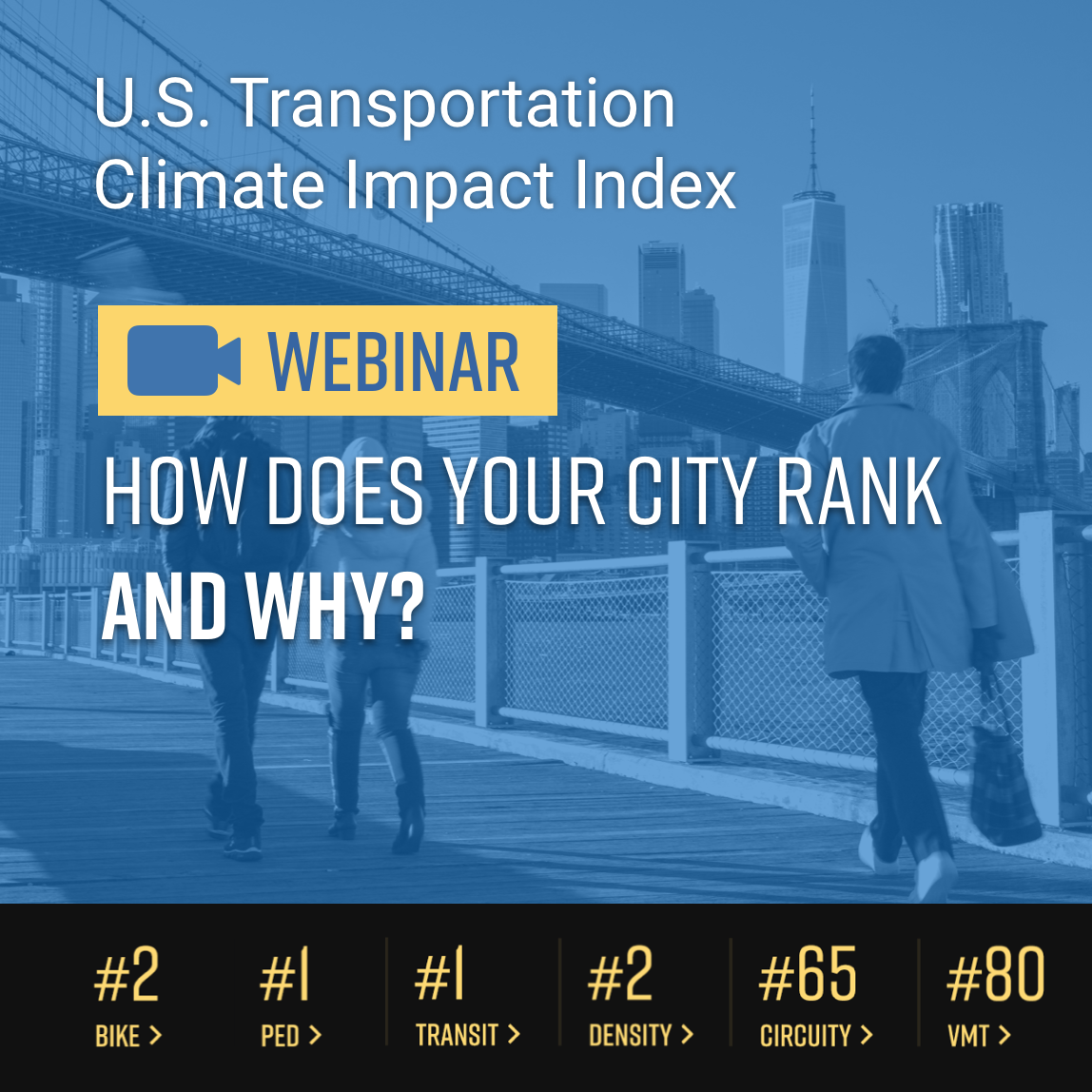
Three Surprising Truths About Transportation Emissions

Almost 10 years ago, as an eager PhD student at Berkeley, I entered a contest to help fund my research topic on collecting data to support wider electric vehicle adoption. Even though my business idea was just for the contest, after I won, the idea took hold in my mind and I soon launched StreetLight Data.
Last month I finished that PhD on Transportation Behavioral Data and Climate Change. In the meantime, StreetLight has expanded to provide metrics for all personal vehicles, trucks, bicycles, and pedestrians. Our scope has grown, but the company’s mission still aligns with my PhD.
That’s why I’m especially excited about some of the surprising findings in our recently released 2019 U.S. Transportation Climate Impact Index. It uses real-world data to measure what’s actually going on with transportation in our cities. The results challenge some of our most-loved assumptions.
Bikes Aren’t the Future
Our sustainability conversation, especially in the media, has focused on really visible types of sustainability. I’m all for biking and walking, but biking in itself isn’t good for the climate, nor is transit, nor walking. From a transportation emissions standpoint, these modes are only good if they displace something bad, like personal petroleum-burning vehicles. The Climate Impact Index encourages us to talk about more robust solutions.
For example, with better land-use planning or some sort of infrastructure we can shift an SUV driver in Texas from 10 miles every day to 5. Or we can build bike lanes in San Francisco and shift a one-mile Prius driver to a bike. Shifting the Texas SUV has vastly more impact.
The Climate Impact Index helps us think in this comparative way, particularly because most cities are never going to build a subway system like New York’s. Yet, there are still big things they can do that have huge climate impact, and those changes should be recognized and rewarded. With this list we wanted to remind everybody that finding the answer is not one-size-fits-all.
Why Congestion Doesn’t Matter
There are so many lists out there focusing on congestion. Sure, congestion is annoying and wastes time, but today’s efficient cars don’t really cause more transportation emissions when they are moving slowly. Congestion in some sense is actually good, because horrible congestion may make people look at alternatives, like transit or bikes.
For our Climate Impact Index we agonized over what factors to weight and how high. In fact, we originally planned to have sliders instead of set weights, so that planners could adjust the weights themselves and see the results. But then we decided our list would have more power if it sparked real conversations around the real issues that affect transportation emissions.
Planting a stake in the ground like that was really hard for me. I’m an academic, and I like to debate pros and cons. I know there’s no perfect algorithm for measuring the impact of transportation emissions. What we can do, however, is push thinking about how data can measure concrete outcomes.
But Maybe Horses Count
Judging from the conversations that have already come back from my colleagues, creating this list was totally worth it. We’ve got people thinking in creative ways.
Some people have responded with strong opinions about what to measure, and why. And I like that they feel deeply about these issues. Maybe they’ll take this transportation emissions impact idea even further than we did.
We’ve gotten a lot of questions about the non-obvious cities on the “Top 10” list like Des Moines and Madison. People ask me how a city like Des Moines can be “sustainable” when they don’t have a developed transit system. Well, it’s because they drive less.
I don’t care how you drive less. I don’t care if it’s because your area has transit, or bike lanes, or a compact environment, or whatever. I’ll take it any way I can get it.
People have really glommed on to the horse and buggy situation in Lancaster as a solution, which I think is fantastic. I’ve ended up in more than a few entertaining conversations about the impact of horse methane emissions (about which I know absolutely nothing).
Let’s Find a Fast Fix
When it comes to climate change, we are running out of time. We need to reduce vehicle miles traveled (VMT) in the most sprawling, most SUV and truck-filled places in the U.S., and we need to do it now.
We studied the factors that we judged important. But it’s infinite really, the data to analyze for understanding and managing transportation emissions. I encourage others to explore their own analyses.
I know that influencing transportation is the most powerful thing I can do in my limited time on earth, because changes in transportation infrastructure deeply affect our carbon output for the next 30 years. That’s where StreetLight works hard to have an impact. After all, if you can’t measure it, you can’t manage it.
